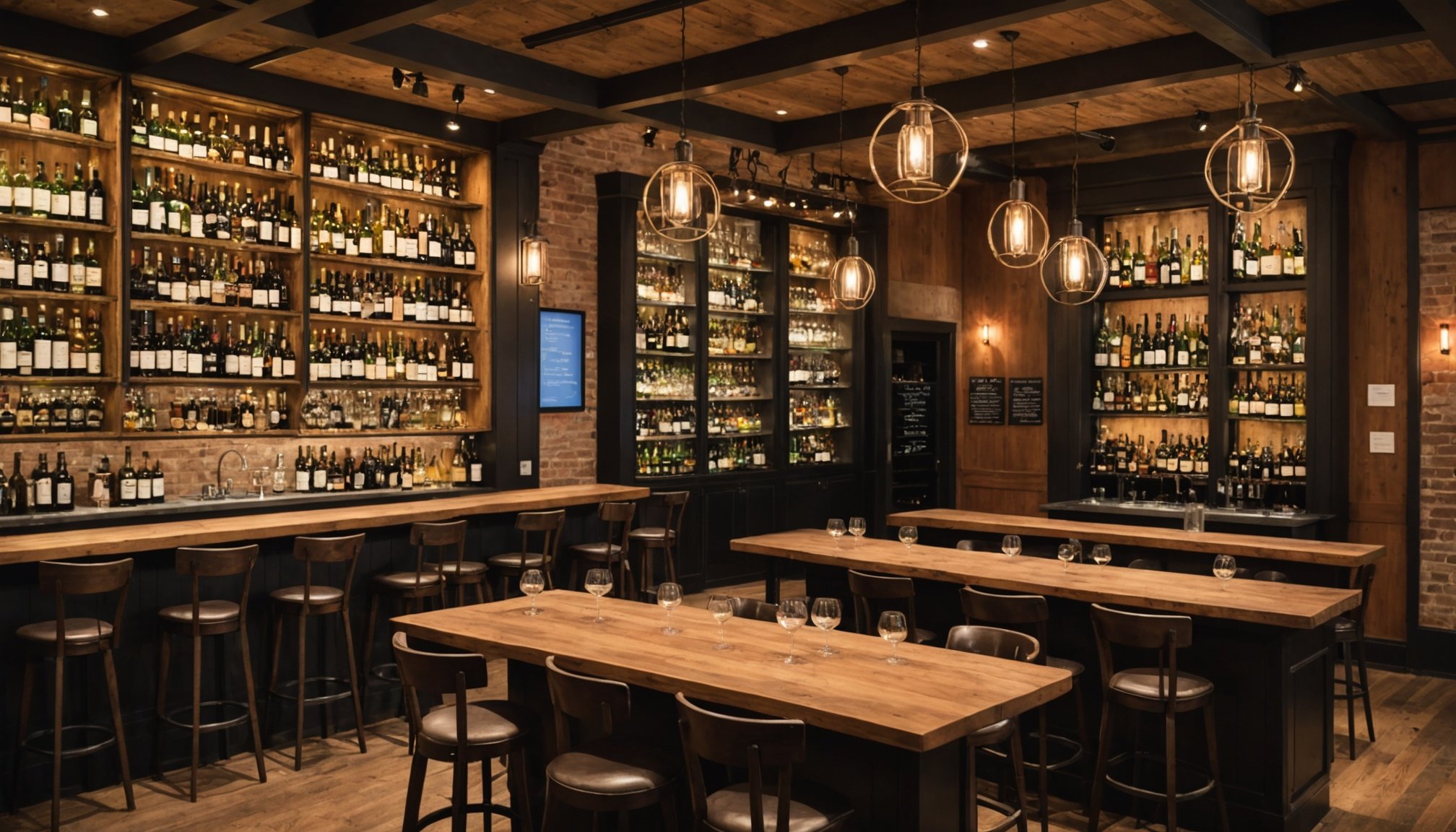Importance of Eco-Friendly Sourcing in the Bar Industry
In recent years, the hospitality industry has witnessed a significant shift towards sustainability, driven largely by consumer preference for eco-friendly products. More customers are demanding transparency and responsibility in the supply chain, particularly with eco-friendly spirits and wines. This trend has not only encouraged bars to adopt sustainable sourcing strategies, but has also created a competitive edge for those that do.
Sustainability in bars is becoming increasingly critical as establishments seek to align with global environmental initiatives. Sourcing eco-friendly spirits can lead to a reduction in the environmental footprint of bar operations, as these products are often produced with less resource-intensive practices. Additionally, utilizing sustainably-sourced products can enhance a bar’s appeal to environmentally-conscious patrons, fostering loyalty and repeat business.
Also read : Elevating dining experience: harnessing customer insights for restaurant menu improvement
Statistics within the hospitality industry indicate a steady rise in demand for eco-friendly spirits and wines. This demand is reshaping bar inventories and menus, as more establishments integrate sustainable options. In meeting this growing consumer need, bars are not only contributing to environmental conservation but also improving their image and standing out in a crowded market.
Innovative Strategies for Sourcing Eco-Friendly Spirits and Wines
Implementing sustainable sourcing strategies is crucial for bars aiming to minimise their ecological impact. By identifying and partnering with eco-friendly suppliers, bars can ensure a continuous flow of responsibly-produced spirits and wines.
This might interest you : Enhancing restaurant appeal: innovative approaches to transform outdoor dining areas
Identifying Sustainable Suppliers
Vetting supplier practices is essential. Bars should look for suppliers with clear commitments to sustainability, such as reduced water usage, organic farming, and minimal chemical inputs. This careful selection helps maintain the integrity of sustainability claims.
Building Relationships with Eco-Conscious Producers
Establishing strong connections with eco-conscious producers can provide a strategic advantage. These partnerships enable bars to offer unique products that resonate with environmentally-aware customers. Additionally, working closely with producers can lead to collaborations on exclusive product lines that highlight the bar’s dedication to sustainability.
Leveraging Local Resources
Utilising regional products is an effective way to minimize carbon footprints. By sourcing from nearby vineyards and distilleries, bars reduce transportation emissions while supporting local economies. This approach not only aids in sustainability but also adds a local flair to the bar’s offerings, enhancing customer engagement and loyalty.
Embracing these strategies not only contributes to environmental responsibility but also fortifies a bar’s position in the hospitality sector, aligning with broader sustainability trends.
Case Studies of Successful Bar Implementations
Exploring real-world examples of sustainable bar examples provides valuable insights into the effectiveness of eco-friendly practices. These case studies demonstrate how some bars have successfully integrated sustainable approaches, offering a blueprint for others in the industry.
In one notable instance, a bar in California focused on partnerships with eco-conscious suppliers to source locally-produced spirits. By prioritising regional products, they were able to drastically reduce their carbon footprint and support the local economy. This resulted in increased customer satisfaction, as patrons appreciated both the quality and ethical sourcing of drinks.
Another bar in London incorporated eco-friendly spirits by updating their inventory with organic wines and spirits. This change didn’t just appeal to their environmentally-conscious customers but also enhanced their reputation as a forward-thinking establishment.
These bars offer pivotal lessons: investing in sustainable practices not only benefits the environment but can also lead to heightened consumer engagement and improved operations. Analysing such examples helps to uncover best practices and underscores the importance of adapting to consumer demand for sustainability in the bar industry.
Guidelines for Selecting Eco-Friendly Spirits and Wines
Choosing eco-friendly products is crucial for bars looking to align with sustainability goals. Key considerations include assessing various sustainability certifications. Certifications such as USDA Organic, Demeter Biodynamic, and Fair Trade can serve as reliable indicators of sustainable alcohol choices. These certifications ensure compliance with environmentally sound agricultural and production methods, reflecting a commitment to ecological balance.
An essential factor is evaluating the environmental impact of production methods. Investigate how ingredients are grown, harvested, and transported. For instance, spirits derived from organic farming reduce harmful pesticide use, while those made closer to the consumer save on fuel emissions. Consequently, understanding the lifecycle of products aids in selecting truly sustainable alcohol choices.
Packaging choices play a critical role as well. Opt for brands using recyclable materials, refillable bottles, or minimal packaging. Waste reduction initiatives not only benefit the environment but also appeal to eco-conscious consumers.
Adopting these guidelines can significantly contribute to a bar’s sustainable operations. Informed decisions resonate with environmentally-aware patrons and reinforce the establishment’s dedication to sustainability in bars, ultimately driving customer engagement and enhancing a positive brand image.
Benefits of Sustainable Practices for Bars
Adopting sustainable practices offers numerous advantages for bars. Key benefits include increased customer engagement and the development of a positive brand image. As consumers increasingly prioritise eco-friendly choices, bars that embrace sustainability can foster enhanced loyalty and repeat business from environmentally-conscious patrons.
While the initial investment in sustainable solutions may appear daunting, such practices often lead to long-term cost savings. Implementing energy-efficient equipment, reducing waste, and sourcing local ingredients can significantly cut overall expenses for bars, translating into financial benefits over time.
Sustainability also bolsters a bar’s reputation, setting it apart in a competitive market. Establishments known for their eco-friendly spirits and commitment to the environment attract positive attention and garner respect from the community. This enhanced reputation not only aids in drawing new patrons but also strengthens existing customer relationships.
In summary, embracing sustainable practices allows bars to thrive by aligning with consumer values, reducing operational costs, and elevating their standing in the hospitality industry. These practices not only contribute to environmental conservation but also solidify a bar’s position as a forward-thinking and socially responsible establishment.
Interviews with Industry Experts on Sustainability
Gaining insights from sustainability thought leaders offers a rich perspective on adopting eco-friendly practices in bars. By interviewing eco-conscious bar owners, we uncover innovative industry best practices that can guide others towards sustainability.
Insights from Eco-Conscious Bar Owners
Bar owners championing sustainability reveal that aligning with sustainable practices fosters stronger customer connections. Their experiences highlight how incorporating eco-friendly spirits enhances consumer perceptions and loyalty. Owners stressed the importance of transparency and dedication to sustainability, citing it as a core value leading to long-term success.
Perspectives from Beverage Suppliers
From a supplier standpoint, increasing demand for eco-conscious products is evident. Suppliers are transitioning towards more sustainable sourcing strategies, responding to growing calls for accountability in production processes. Many are investing in organic farming and reducing waste, emphasising the changing landscape in the hospitality industry.
Input from Sustainability Consultants
Sustainability consultants predict further growth in sustainability in bars as both a necessity and opportunity. They underscore adopting technologies that minimise waste and carbon footprints. Consultants advise bars to remain adaptable, investing in continuous education on sustainability innovations and trends to stay ahead. These expert recommendations solidify the path for future sustainable practices.











